Products You May Like
Receive $50 off an eligible $100 purchase at the Outside Shop, where you’ll find gear for all your adventures outdoors.
Sign up for Outside+ today.
We’re sharing this story for free. For more essays about the different ways we all experience the outdoors, become an Outside+ member today.
Many of us take to the outdoors for extreme adventures—to push limits and test boundaries. We see the most thrilling aspects of outdoor life plastered all over social media in a never-ending scroll: thru-hiking a major trail, summiting dangerous and difficult peaks, overlanding across continents, slacklining above sheer canyons. Depending on who you are, it can inspire you to follow in their tracks, or leave you feeling down.
Don’t get me wrong. I love seeing individuals push beyond their limits and elevate what they’re capable of. I appreciate how they inspire me to step out of my own comfort zone and dare me to reach for more. However, I believe it’s equally—if not more—important to remember that spending our precious and limited time outdoors isn’t always about the thrill of doing something incredible while we’re there. Sometimes, it’s about quite the opposite.
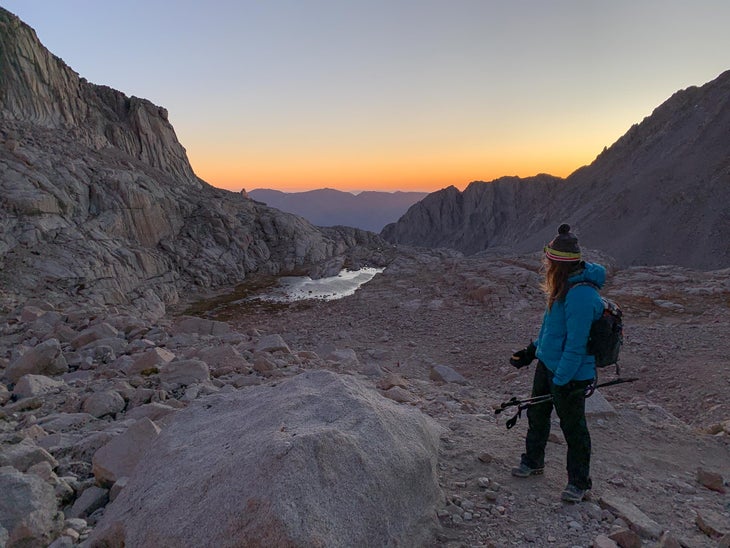
In May 2020, a few months into the Covid-19 pandemic, I got sick. I was bedridden for almost two weeks with overwhelming fatigue, difficulty breathing, joint and muscle aches, and more. Now, over a year and a half later, I still haven’t fully recovered. Diagnosed with suspected long Covid (I never had a positive test), Postural Orthostatic Tachycardia Syndrome (POTS), and presenting with nearly every symptom of Myalgic Encephalomyelitis/Chronic Fatigue Syndrome (but without an official diagnosis), my life and physical ability have been significantly altered for the foreseeable future.
More of a moderate partaker in outdoor adventure, I cruised the blues on my snowboard, hiked challenging but non-technical trails, ran a few miles here and there, and jumped at the opportunity to learn new activities like mountain biking, wakeboarding, and dirt biking. Before 2020, my legs carried me hundreds of miles on trails to the Mt. Everest base camp, to the top of Mt. Whitney, and through Inca ruins in the Andean Mountains. These particular endeavors didn’t require much technical know-how, though certain levels of determination, preparation, and physical ability were all a must.
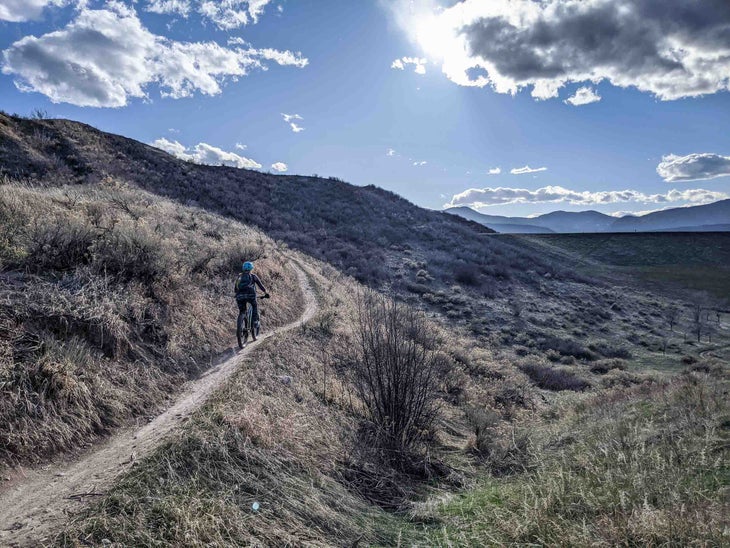
The weekend before falling ill, I mountain biked a challenging portion of the Colorado Trail. New to mountain biking, I loathed the uphill portions and also feared the downhill, even if it was exhilarating. But there’s just something about mountain biking that forces you to let go of that fear, trust the bike (and yourself), and continue down the path. Pleased with myself and my progressing skills, I called the weekend trip a success and headed home with my partner, Mike.
Over the next few days, fatigue completely enveloped me. I couldn’t focus long enough to read, make sense of a single email, or get through a day without a several-hour-long nap. At times, my body felt like it was filled with jello rather than muscle and bone. And then my breath—which I’ve always taken for granted—betrayed me. I couldn’t stand up without gasping for more air; I would breathe harder and harder, but my lungs would still feel like a deflated balloon. The breathlessness I experienced while lying in bed was more severe than anything I had ever felt before, even at 18,000 feet of elevation.
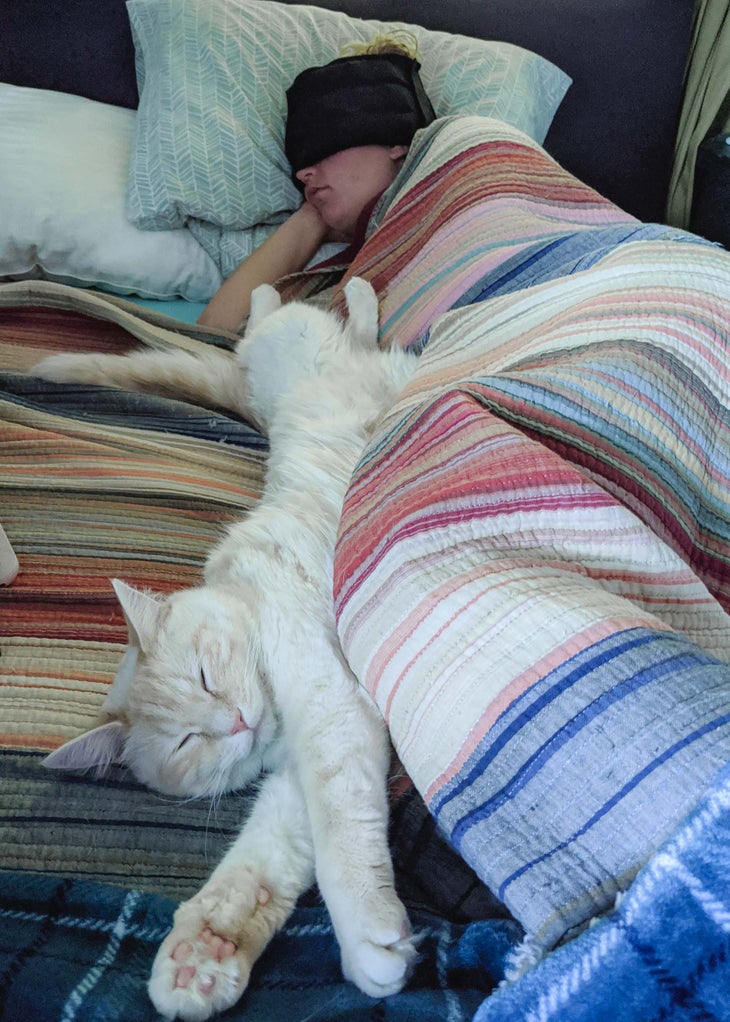
Since then, there have been weeks at a time when I’ve been bedridden, periods of improvement when I thought it was all behind me, heartbreaking relapses, and a constant, agonizing effort to try and help speed the recovery process along. I quit my job, unable to keep up with the mental and physical demands of working on my laptop from home all day. A flat, two-block walk exhausted me for days afterwards. At times, my heart would race to 140 bpm while just sitting still on my couch, and any overexertion could lead to extreme disorientation, breathlessness, and post-exertional malaise.
This was the predicament I found myself in: Unable to work, dependent on my partner physically and emotionally, and bound to the confines of my bed, couch, and a radius of a few blocks in my neighborhood.
Not long before my long Covid had set in, Mike and I were both working from home and taking advantage of the flexibility that our working situation afforded us. We had decided that it was a good time to upgrade our camping setup so that we could work easily from the outdoors. Fast forward to several months later, we have a snazzy new Scout camper sitting in the bed of our truck, and we’re all loading up in the cab—Mike, me, our dog, Granger, and our cat, Walker—ready to hit the road.
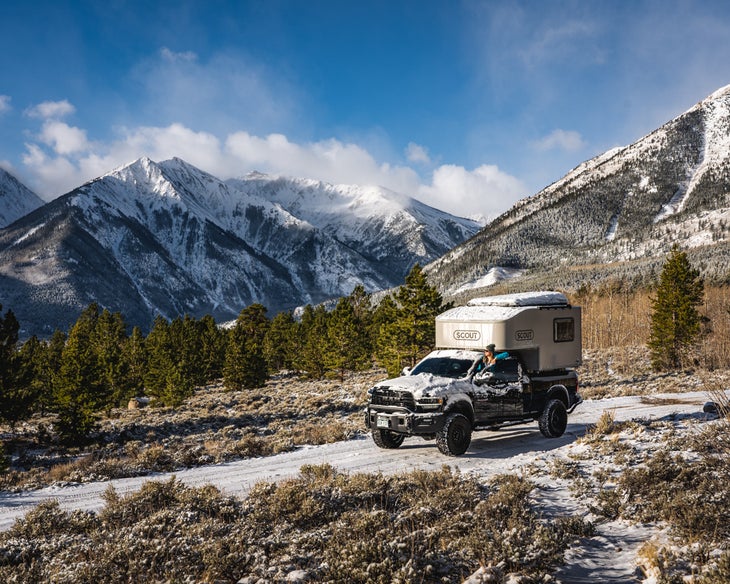
It turns out that being confined to a small radius around your bed isn’t quite so devastating when you can take your bed with you anywhere. This past year and a half, I’ve been chronically ill, but I’ve also experienced immense natural beauty. I’ve slept on a cliff overlooking the mesmerizing Lake Powell, I’ve driven through otherworldly landscapes in southern Utah, I’ve napped on the sandy ground in the Alabama Hills overlooking the eastern Sierras, I’ve hammocked lazily between giant pine trees in the Pacific Northwest slipping in and out of sleep, and I’ve taken dips in refreshingly chilly mountain lakes in Montana. Though my body has never been weaker, I have lived quite fully.
Learning to navigate my newfound disabilities and limitations has certainly been physically and emotionally daunting. But when you’re surrounded by such profound natural beauty and living in a constant state of awe, it’s easier to shift your focus toward gratitude rather than succumb to despair. I’m beyond grateful that I’ve had the ability to spend the majority of my time over these challenging months in our truck camper traveling across the states and exploring excitingly new and remote places. It has kept a sense of wonder and adventure alive during a time when my ability to employ my typical modes of adventure have dissipated into thin air.
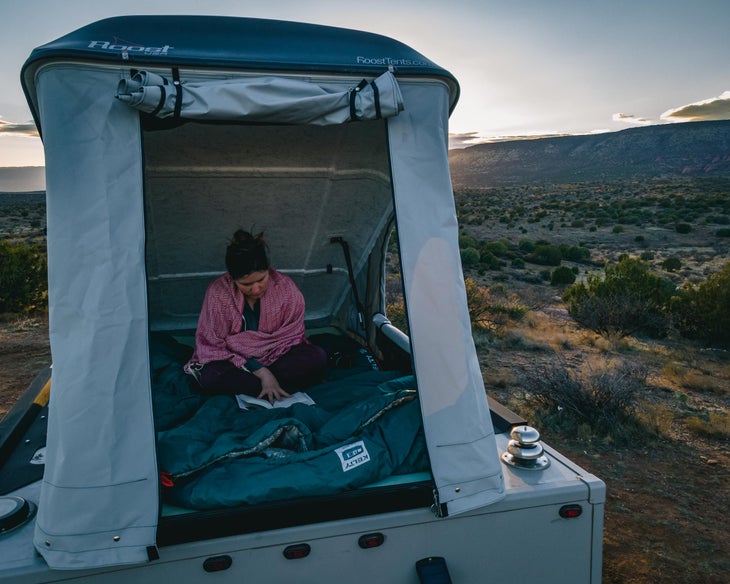
I know I’m not the only one who has leaned on the outdoors for support during this trying time. People are flocking to nature en masse in search of reprieve from the pandemic. What many of us have long known, others are just beginning to discover: Life often feels simpler when you’re in nature. For me, it has meant everything. It has helped me keep depression and grief at bay, process the changes in my life, and feel fulfilled while physically being still.
We often look to the outdoors and wonder what we can do there. How much of it can we traverse and discover? How can we conquer its terrain and its heights? How can we use it as a tool to measure our own physical abilities and mental strength? But rather than considering all that we can do in the outdoors, perhaps sometimes we should simply behold the beauty and peace it proffers and take a moment to consider how we can just be there.
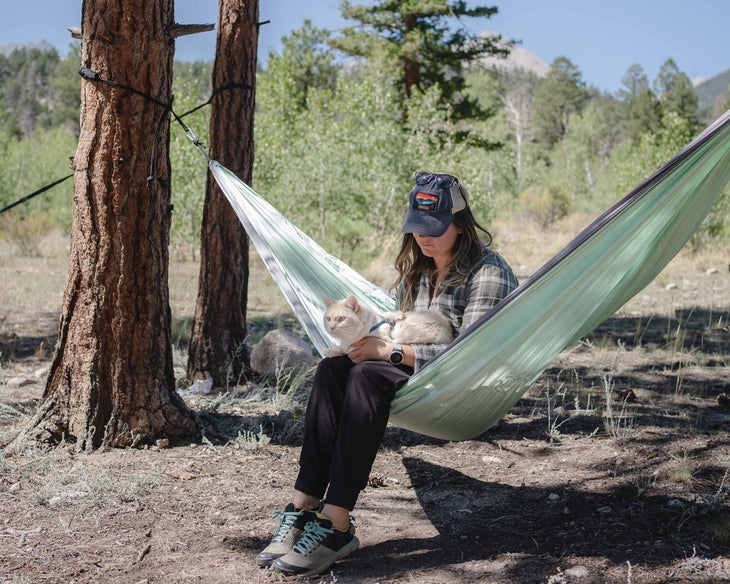
As I write this, I’m sitting at a picnic table in a campground on the Olympic Peninsula in Washington state. It’s summertime, and heat waves are tormenting much of the country. But, the air here is crisp—reminiscent of the early days of fall back home, my favorite time of year. Waves are steadily lapping against the rocks and tide pools below the cliff I’m perched on. A gentle breeze dances with loose wisps of my hair and sends a chill traveling from the back of my neck through the rest of my body. I’m here. I’m present. And I get to experience the natural beauty that is all around me.
There is still so much that I dream about doing, if someday I happen to get better. But I’ve also had to confront the possibility that this could be my new normal, and I might need to learn to adapt and dream new dreams, ones that are attainable with the physical limitations that my body has set. This illness may have zapped my energy levels and wiped out my lung and muscle strength, but the last thing I would want is for it to dull my sense of adventure and appreciation for the outdoors. Through all of this, what I’ve learned is that adventure doesn’t just have to be for the doers. Sometimes it takes more courage to delve within.
